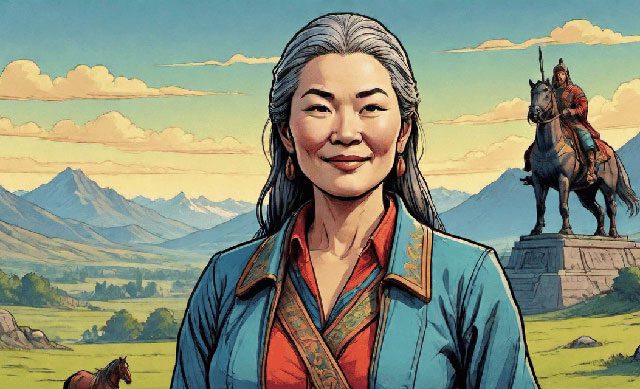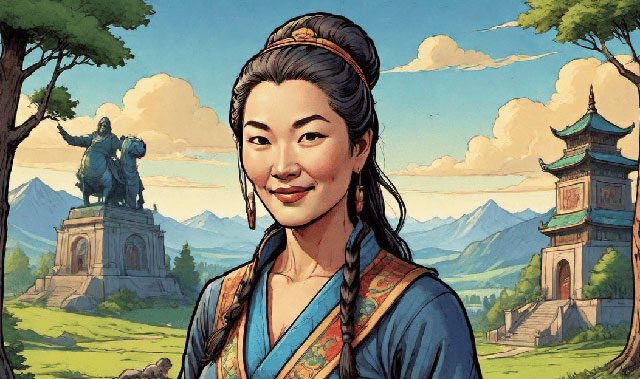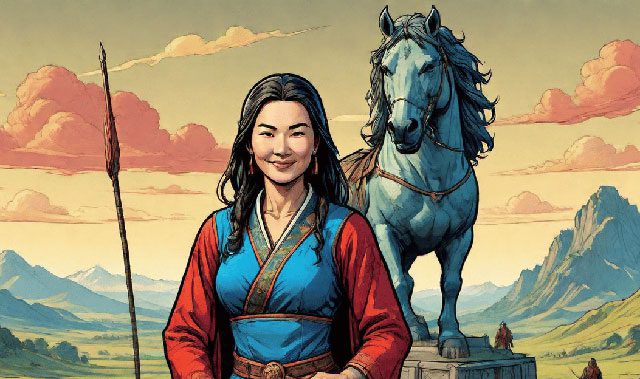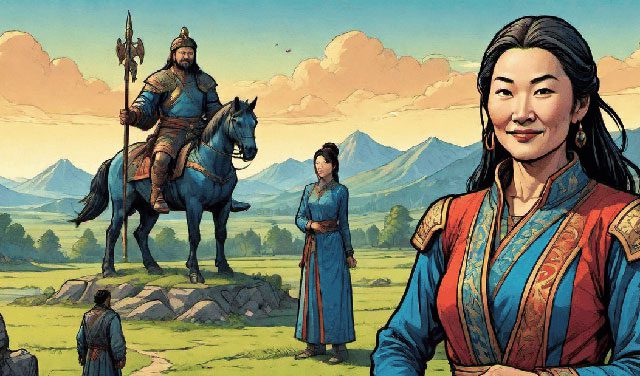Behind the image of a mighty hero lies another aspect of his personal life, where this “particular preference” becomes a topic of discussion and obsession for many women in ancient times.
Genghis Khan, the renowned Khan in history, is known not only for his unparalleled military prowess but also for his “particular preference” that fascinated women of his time. Unlike other kings who were enamored with the beauty of young maidens, Genghis Khan had a special fondness for married women. After each victory, the wives of the defeated often found themselves taken into his harem, leading to tragic consequences for their lives.

During his conquests, women from the lands he conquered were often captured as slaves or became spoils of war for the Mongols. They suffered immense pain and loss, becoming victims of war. (Illustrative image).
The reason behind this “particular preference” stems from Genghis Khan’s childhood experiences. He was born into a tribal chief’s family, where his mother was the wife of an enemy. His father, Yesugei, after defeating a rival in battle, took her as his wife. This background and the lack of maternal affection in his early life profoundly influenced Genghis Khan’s emotional perceptions later on.
It can be said that this “particular preference” partially arises from a desire to compensate for the emotional void that Genghis Khan experienced in the past. The image of the mature, independent, and strong woman exuding resilience and protection may have become a source of support for the great Khan amidst the upheavals of life.

According to many historical records, Genghis Khan had a vast harem, which included hundreds of concubines and wives from various countries and ethnicities. The exact number is still a topic of debate, but researchers estimate it could have reached into the thousands. (Illustrative image).
Genghis Khan’s behavior, while contrary to the norms and ethics of the feudal society of China at the time, is not too difficult to understand within Mongolian culture. In the ancient marriage customs of nomadic peoples, it is quite normal for a son to inherit his father’s property and wives after the father’s death. Thus, bringing the wives of the defeated into his harem was a logical outcome.

Unlike many other kings who favored physical beauty, Genghis Khan had unique standards for choosing concubines. (Illustrative image).
According to records, he did not place much importance on beauty but valued qualities such as intelligence, strength, and fertility. Many of Genghis Khan’s concubines were women from noble backgrounds or with exceptional talents. They were not only favored but also played crucial roles in governing the country and assisting Genghis Khan with national issues.
For nomadic peoples, the reproductive capacity of married women was incredibly valuable, especially in harsh living conditions with sparse populations. Genghis Khan’s preference for married women may also relate to his emphasis on fertility and increasing the lineage of his clan.
Over time, perspectives on this “particular preference” have gradually changed. In modern society, attitudes towards remarried women have become more tolerant, free from the prejudices and discrimination of the past. Understanding Genghis Khan’s “particular preference” not only helps us gain a deeper insight into this complex historical figure but also provides profound insights into cultural differences and social development throughout history.

The role of women during the time of Genghis Khan reflects the diversity and complexity of Mongolian society at that time. (Illustrative image).
Genghis Khan’s particular preference for women has left behind a complex and controversial legacy. On one hand, it contributed to the formation of a powerful and vast Mongol Empire, while also giving status and influence to women in Mongolian society at that time. On the other hand, the appropriation of women and turning them into spoils of war is a brutal act and a violation of ethics. It has contributed to the image of Genghis Khan as aggressive and ruthless in the eyes of many.
The role of women during the time of Genghis Khan was not merely as homemakers or childbearers but reflected the diversity and complexity of Mongolian society at that time. Like women in many other cultures, Mongolian women played crucial roles in family care. They managed household tasks, cooking, cleaning, sewing, and raising children.
As Mongolian men were often away waging wars, women played vital roles in managing family assets and the economy. They tended livestock, cultivated land, engaged in trade, and made financial decisions.
Mongolian women are known for their strength and courage. They could ride horses, shoot arrows, and fight alongside men when necessary. Thus, they also imparted cultural, moral values, and essential survival skills to their children, playing a significant role in shaping the future generations of Mongolia.


















































